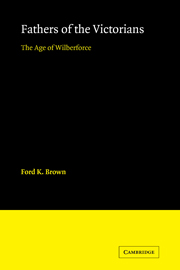Book contents
- Frontmatter
- Contents
- Dedication
- Foreword
- PART I WAR ON THE GENTILE WORLD
- 1 Fat Bulls of Bashan
- 2 The Moses of the Israelites, a Courtier of Pharaoh
- 3 Disciples in Caesar's Household
- 4 Citizenship in Heaven
- 5 Sennacherib's Army: The Rally round the Alter
- PART II LABOURING FOR THE SPIRITUAL IMPROVEMENT OF OTHERS
- PART III ENGLAND IN DANGER
- Bibliography
- Index
2 - The Moses of the Israelites, a Courtier of Pharaoh
Published online by Cambridge University Press: 11 March 2010
- Frontmatter
- Contents
- Dedication
- Foreword
- PART I WAR ON THE GENTILE WORLD
- 1 Fat Bulls of Bashan
- 2 The Moses of the Israelites, a Courtier of Pharaoh
- 3 Disciples in Caesar's Household
- 4 Citizenship in Heaven
- 5 Sennacherib's Army: The Rally round the Alter
- PART II LABOURING FOR THE SPIRITUAL IMPROVEMENT OF OTHERS
- PART III ENGLAND IN DANGER
- Bibliography
- Index
Summary
All armed prophets have conquered, all unarmed have been destroyed.
machiavelliThat state of the spiritual life of England had at least brought about one circumstance that could be useful to new leaders of a movement of national reform if they were level-headed and practical. At the end of the century they had directly before them not only the inspiring example of two great religious reformers but their giant errors. It would have been hard to overlook those errors and fantastic, in any sensible person, to repeat them. That the Evangelicals did neither made the difference between complete failure as a more gentlemanly continuation of the Wesleyan Revival and the success they won—qualified as it was, great nevertheless.
There is no wish here to undervalue John Wesley's contribution to the quickening of English spiritual life. But when Wilberforce, seeing the corruption and profligacy, the destructive poison, that had culminated in the Age of Elegance, set out on his divinely appointed mission to reform the land, George Whitefield had been dead nearly twenty years and Wesley had four years to live. Merely to observe that the Methodist Revival had then been preached for half a century is enough to make the point that no matter what he accomplished, Wesley left very much to be done. The simplest examination of his Revival shows why that was so. It was designed to appeal to the wrong people. Wesley's mission was ‘chiefly to the poor’, what he did was ‘in the meeting, and amongst the multitude’. In terms of national reform in eighteenth-century England such a mission and such an accomplishment was not only not enough: it was hopeless.
- Type
- Chapter
- Information
- Fathers of the VictoriansThe Age of Wilberforce, pp. 45 - 82Publisher: Cambridge University PressPrint publication year: 1961



